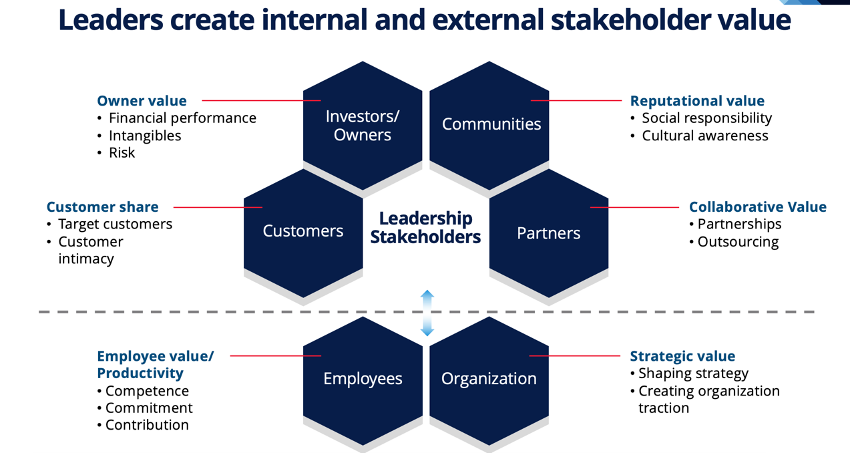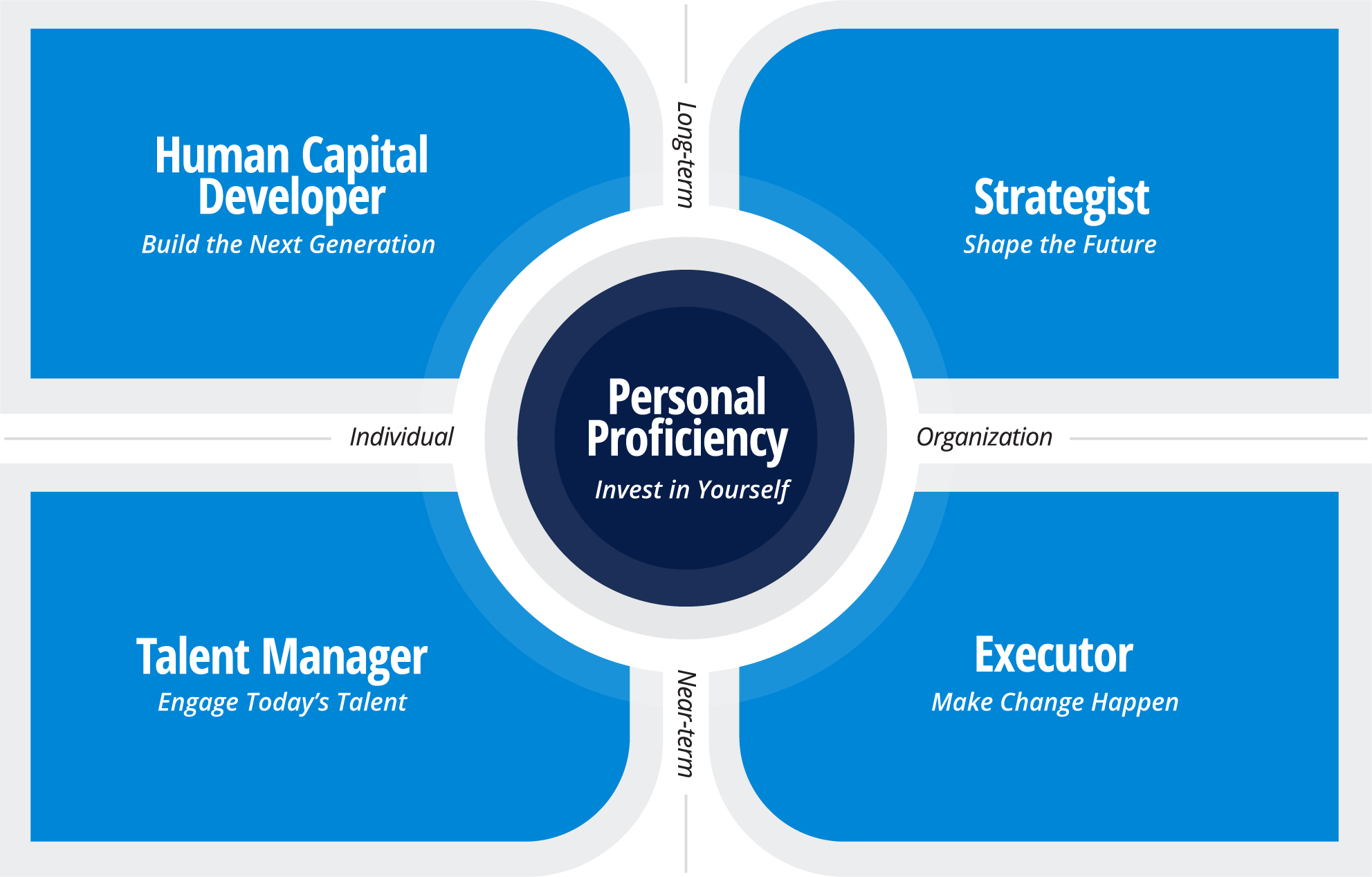A Post-Pandemic View of Leadership Requirements
Key Take-Aways:
- Leadership matters because leaders determine how organizations deliver on customer, investor, strategy, and employee expectations.
- While the foundational principles of the Leadership Code remain relevant, our research in the covid and post-covid era reveals new imperatives within each domain that enable leaders to successfully lead in a changed world.
- The RBL Leadership Code® is composed of five domains. Leaders must act as effective strategists, executors, talent managers, and human capital developers, while maintaining personal proficiency.
- Leaders often have a predisposition to one or two of the five Code domains, but can learn to be proficient in all five; leadership development curriculum should offer a balanced focus on all five domains of the leadership code.

A Post-Pandemic View of Leadership Requirements

We’ve been through an unprecedented era of change that has called on leaders to step up and take on new levels of responsibility. With the significant changes that have impacted workplaces and the global business environment, leadership is even more important today than it has been in the past.
Why Leadership Matters
Leadership is the critical lever in delivering the results organizations promise to external stakeholders. Good leaders inspire higher employee engagement. They ensure customers have great experiences consistent with their firm’s brand promises. They are on the front lines of creating internal and external stakeholder value. They also ensure growth and attractive financial returns for investors. Great leaders lead in a way that demonstrates awareness of the organization’s social responsibility and community and customer expectations.

Leading organizations understand the impact leaders have. They spend significant time and resources investing in, attracting, and building leaders. In 2021, U.S. companies alone spent $160 billion on employee training and education. However, the same study showed that only 10% of CEOs believe their company’s leadership development initiatives have a clear business impact and 77% of organizations report they are currently experiencing a leadership gap.
The Leadership Code
Solutions to upgrading leadership need to include a greater focus on building the right leadership behaviors that drive stakeholder value. In the work that we’ve done during Covid, we’ve refreshed and reframed the five domains of the Leadership Code.

Covid has changed where, how, and what work is done. While these domains remain foundational to leadership effectiveness, the emphasis within them has evolved in response to recent disruptions. Let’s examine how the demands of leadership have evolved in each of the five domains of the Leadership Code.
Shape the future
This domain is about strategy. Strategists answer the question “Where are we going?” and make sure that those around them understand the direction as well. They not only envision but can also create a future. They figure out where the organization needs to go to succeed, they test these ideas pragmatically against current resources (money, people, organizational capabilities), and they work with others to uncover how to get from the present to the desired future. Strategists have a point of view about the future and are able to position their organization to create and respond to that future. The rules for strategists are about creating, defining, and delivering principles of what can be.
What are the new imperatives?
It’s now up to strategist to not only shape the future but to:
- Create information asymmetry by separating signal from noise.
- Harness uncertainty.
Make things happen
This domain is about execution and turning what they know into what they do. The executor domain focuses on the question, “How will we make sure we get to where we need to go?” Executors translate strategy into action and know how to make positive change. They make decisions and create accountability. They work through others to get things done. They have the technical expertise to get things done right.
What are the new imperatives?
Increased global uncertainty means that individuals have less trust for others and less confidence in the future. It’s more important than ever to:
- Create the “right” culture (outside/in; value of values).
- Provide guidance to improve decision-making to deliver results.
Engage today’s talent
This domain is about fully engaging today’s talent. Leaders who are talent managers know how to identify, build, and engage talent to get results now. They identify what skills are required, draw talent to their organizations, engage them, communicate extensively, and ensure that employees turn in their best efforts. Talent managers generate intense personal, professional, and organizational loyalty, and help people develop themselves for the good of the organization.
What are the new imperatives?
New insights here point toward the growing importance of authenticity and the ability to inspire others.
- Personalize employee work relationships.
- Manage mental health/employee experience.
Build the next generation
This domain is concerned with building next-generation leaders. Leaders who are human capital developers answer the question, “Who stays and sustains the organization for the next generation?” Just as good parents invest in helping their children succeed, human capital developers help future leaders succeed. Human capital developers throughout the organization build a workforce plan focused on future talent, understanding how to develop potential talent, and helping employees see their future careers within the company. They ensure that the organization will outlive any single individual. Human capital developers employ rules that demonstrate a pledge to building the next generation of talent.
What are the new imperatives?
Now, leaders not only need to keep long-term competencies in their focus for continued competitive advantage, but they must also:
- Empower others to build their brand.
- Build long-term relationships.
Invest in yourself
At the heart of the Leadership Code — literally and figuratively — is personal proficiency. Effective leaders cannot be reduced to what they know and do. Who they are as human beings has everything to do with how much they can accomplish with and through other people.
Leaders are learners — from success, failure, assignments, books, classes, people, and life itself. Passionate about their beliefs and interests, they expend enormous personal energy and attention on whatever matters to them. Effective leaders inspire loyalty and goodwill in others because they themselves act with integrity and trust. Decisive and impassioned, they are capable of bold and courageous moves. With a tolerance for ambiguity, they are confident in their ability to deal with situations as they arise.
What are the new imperatives?
The biggest shift in this domain is the need to attend to mental health by being willing to talk about your own stress as a leader and things that are going on in your life. This can be challenging because it requires leaders to:
- Navigate paradox.
- Learn always.
- Be transparent and renew.
Closing the Gap
In summary, as we have looked at how the demands on leaders have changed, these observations can help guide more effective leadership development and create greater business impact.
Leadership development curriculum should offer a balance in all five domains of the leadership code. As you’re building leaders, increasing your focus on these refreshed foundational leadership domains can help you deliver on the promises you’re making to customers, investors, and employees.
Explore RBL’s newest digital leadership development offering, the Leadership Code Academy for a simple and cost-effective way to build leadership capability in your leaders today.


